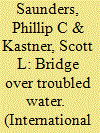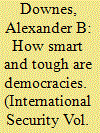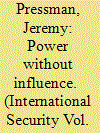|
|
|
Sort Order |
|
|
|
Items / Page
|
|
|
|
|
|
|
| Srl | Item |
| 1 |
ID:
087293


|
|
|
|
|
| Publication |
2009.
|
| Summary/Abstract |
In Taiwan's 2008 presidential election, both candidates advocated signing a peace agreement with China, and Chinese leaders have also expressed interest in reaching such an agreement. Although substantial obstacles remain in the way of a cross-strait peace agreement, this increased interest on both sides of the Taiwan Strait suggests that a closer examination of an agreement's possible dimensions and consequences is warranted. This analysis considers what an agreement might look like, whether and how it might be effective in reducing the possibility of cross-strait military conflict, the relevant barriers to an agreement, and whether an agreement-if reached-would be likely to endure.
|
|
|
|
|
|
|
|
|
|
|
|
|
|
|
|
| 2 |
ID:
087288


|
|
|
|
|
| Publication |
2009.
|
| Summary/Abstract |
Proponents of the selection effects argument claim that because democratic leaders run a higher risk of losing office than autocratic leaders if they fail to win wars, they are more careful than their authoritarian counterparts in choosing which wars to initiate. The robust marketplace of ideas in democracies also weeds out self-serving or ill-conceived policies and allows democratic leaders to better estimate the chances of victory. Democracies, according to this logic, tend to pick on weak or vulnerable opponents and thus win a disproportionate number of the wars they start. Both quantitative and qualitative evidence, however, challenges this conclusion. The statistical correlation between democracy and victory is not robust to reasonable alternative choices for analyzing the data. In particular, including draws as a war outcome renders statistically insignificant the finding that democratic initiators and targets are more likely to win. In addition, democratic leaders who initiate wars should be optimistic that they will win, but process tracing of the decision by Lyndon Johnson's administration to escalate the Vietnam War (one of these omitted draws) reveals that top officials knew at the time that escalation promised a costly, protracted stalemate, yet they chose to fight anyway. Moreover, domestic politics, if anything, contributed to Johnson's decision to fight in Vietnam despite the poor odds of victory because he believed that pulling out would spark a backlash and destroy his Great Society legislative program.
|
|
|
|
|
|
|
|
|
|
|
|
|
|
|
|
| 3 |
ID:
087295


|
|
|
|
|
| Publication |
2009.
|
| Summary/Abstract |
Prospects for democracy in Iraq should be assessed in light of the historical precedents of nations with comparable political experiences. Saddam Hussein's Iraq was an unusually extreme autocracy, which lasted an unusually long time. Since the end of the nineteenth century, only thirty nations have experienced an autocracy as extreme as Iraq's for a period exceeding two decades. The subsequent political experience of those nations offers a pessimistic forecast for Iraq and similar nations. Only seven of the thirty are now democratic, and only two of them have become established democracies; the democratic experiments in the other five are still in progress. Among the seven, the average time required to transit the path from extreme autocracy to coherent, albeit precarious, democracy has been fifty years, and only two have managed this transition in fewer than twenty-five years. Even this sober assessment is probably too optimistic, because Iraq lacks the structural conditions that theory and evidence indicate have been necessary for successful democratic transitions in the past. Thus, the odds of Iraq achieving democracy in the next quarter century are close to zero, at best about two in thirty, but probably far less.
|
|
|
|
|
|
|
|
|
|
|
|
|
|
|
|
| 4 |
ID:
087297


|
|
|
|
|
| Publication |
2009.
|
| Summary/Abstract |
The administration of President George W. Bush was deeply involved in the Middle East, but its efforts did not advance U.S. national security. In the realms of counterterrorism, democracy promotion, and nonconventional proliferation, the Bush administration failed to achieve its objectives. Although the United States did not suffer a second direct attack after September 11, 2001, the terrorism situation worsened as many other countries came under attack and a new generation of terrorists trained in Iraq. Large regional powers such as Egypt and Saudi Arabia did not become more democratic, with no new leaders subject to popular mandate. The model used in Iraq of democratization by military force is risky, costly, and not replicable. Bush's policy exacerbated the problem of nuclear proliferation, expending tremendous resources on a nonexistent program in Iraq while bolstering Iran's geopolitical position. The administration failed because it relied too heavily on military force and too little on diplomacy, disregarded empiricism, and did not address long-standing policy contradictions. The case of the Bush administration makes clear that material power does not automatically translate into international influence.
|
|
|
|
|
|
|
|
|
|
|
|
|
|
|
|
| 5 |
ID:
087290


|
|
|
|
|
| Publication |
2009.
|
| Summary/Abstract |
Democracy does not cause peace among nations. Rather, domestic conditions cause both democracy and peace. From 1961 to 2001, democratic nations engaged in numerous fatal conflicts with each other, including at least one war, yet not a single fatal militarized incident occurred between nations with contract-intensive economies-those where most people have the opportunity to participate in the market. In contract-intensive economies, individuals learn to respect the choices of others and value equal application of the law. They demand liberal democracy at home and perceive it in their interest to respect the rights of nations and international law abroad. The consequences involve more than just peace: the contract-intensive democracies are in natural alliance against any actor-state or nonstate-that seeks to challenge Westphalian law and order. Because China and Russia lack contractualist economies, the economic divide will define great power politics in the coming decade. To address the challenges posed by China and Russia, preserve the Westphalian order, and secure their citizens from terrorism, the contract-intensive powers should focus their efforts on supporting global economic opportunity, rather than on promoting democracy.
|
|
|
|
|
|
|
|
|
|
|
|
|
|
|
|
|
|
|
|
|